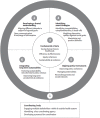A Framework for Improving Policy Priorities in Managing COVID-19 Challenges in Developing Countries
- PMID: 33154960
- PMCID: PMC7591500
- DOI: 10.3389/fpubh.2020.589681
A Framework for Improving Policy Priorities in Managing COVID-19 Challenges in Developing Countries
Abstract
The COVID-19 pandemic has brought unprecedented challenges to societies and threatened humanity and global resilience. All countries are challenged, but low-income and developing countries are facing a more challenging situation than others due to their limited health infrastructure, limited financial and human resources, and limited capacity of governments to respond. Further, the interconnected nature of the COVID-19 pandemic crisis demands an integrated approach and coordinated action, which complicates decision making even more. Identifying the best set of policies and instruments to address COVID-19 challenges, and aligning them with broader social goals will be critically important for sustainable recovery from the pandemic. The key practical challenge facing the policy makers of developing countries is how to prioritize policies to achieve the interconnected goals of managing the health crisis, recovering the economy, and achieving environmental sustainability. We present a framework for identifying and prioritizing policy actions to address the COVID-19 challenges and ensure sustainable recovery. The framework outlines principles and criteria and provides insights into developing shared policy goals, identifying smart strategies, assessing policy compatibility, aligning policy instruments, and factoring sustainability into short and long-term policy decisions. This framework can assist policy makers in linking short and long-term goals, mapping the interactions of different policy options, and assessing anticipated consequences and cross-sectoral implications. This will enable policy makers to prioritize policy choices and allocate limited resources in such a way that they are directed toward actions that generate synergy and co-benefits, have multiplier effects, and achieve interconnected solutions for health, the economy and environment.
Keywords: COVID-19 pandemic; developing countries; health crisis; policy coordination; policy prioritization; sustainability.
Copyright © 2020 Rasul.
Figures
References
-
- ICIMOD COVID-19 Impact and Policy Responses in the Hindu Kush Himalaya. Kathmandu: International Centre for Integrated Mountain Development; (2020). https://lib.icimod.org/record/34863.
-
- Rym A. Time for a Decisive Coordinated Response to a Costly Global Covid-19 Systemic Crisis: Towards a Resilient Global System, EMEA Policy Paper, April 2020. (2020). Available online at: www.euromed-economists.org (accessed June 1, 2020).
-
- Global Health Security Index (2019). Available online at: www.ghsindex.org (accessed June 3, 2020).
-
- WDR World Development Report 2019: The Changing Nature of Work: Main Report. Washington, DC: World Bank Group; (2019).
Publication types
MeSH terms
LinkOut - more resources
Full Text Sources
Medical


